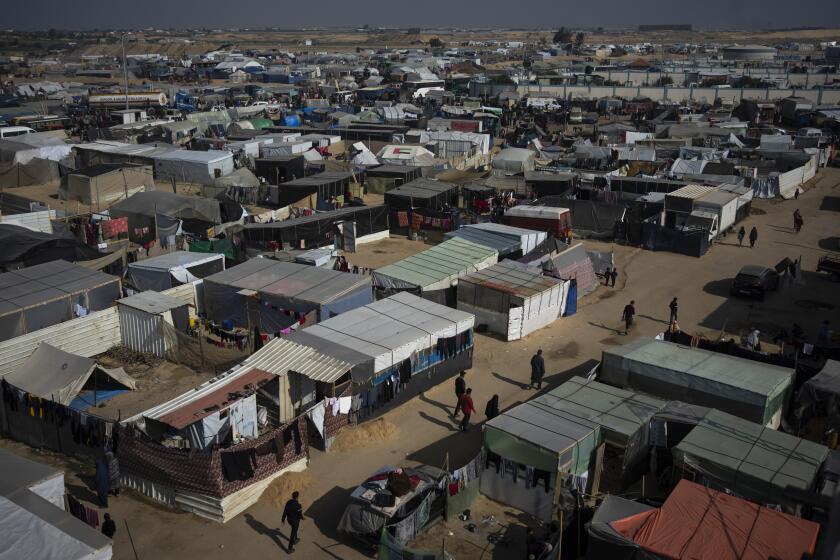War Talk Dominates Church Council Assembly
Though feminism and financial issues are sporadically raised, delegate conversations at the 7th Assembly of the World Council of Churches have been dominated by talk about the war in the Middle East.
Even before the assembly opened last week, the World Council’s executive committee issued a call for the immediate end to hostilities in the Gulf. The war has reached “ominous proportions and tragic consequences,” threatening all of God’s creation, the committee said.
While some here criticized the executive committee’s statement as “provocative” in that it preempted a statement expected before the assembly ends next Wednesday, the Rev. Emilio Castro, World Council general secretary, said he was glad for the controversy.
“It would be tragic if no one paid any attention,” Castro said. “When governments are doing well in war, they are never interested in negotiating for peace,” said Castro, but it is “incumbent upon the church of Jesus Christ to call for peace,” even though all may not favor an immediate cease-fire.
The council, which meets every seven to nine years to act as an ecumenical and moral forum, represents 316 churches of Protestant, Anglican and Eastern Orthodox traditions--six having been added at this meeting.
Some assembly participants said they fear the Gulf War threatens to overshadow all other issues here, especially that of the Soviet incursion into the Baltic states last month, which many European and Canadian delegates see as a situation seriously in need of the churches’ response.
“Gulf, Gulf--not one more word. I can’t stand it. My people have been dying for decades,” said Elsa Tesfay-Musa, an Eritrean-Canadian, who said that the conflicts in Liberia, Somalia, Sudan and East Timor have failed to capture the church’s moral outrage in anything like the way the Gulf War has. She is a Lutheran church worker in Canada.
Feminist concerns were raised more than once.
“You will notice the number of women delegates at this assembly will still not reach the 40% quota we set in Vancouver (Canada, at the last assembly in 1983),” the Rev. Lois Wilson of the United Church of Canada told a news conference.
“It is mainly because the member churches continue to send male delegates,” she said. “Now that says to me a structural injustice which has to be addressed by the Christian community,” she said.
Chung Hyun Kyung, a woman Presbyterian theologian from South Korea, caused heated debate one day by saying the Holy Spirit was female.
“I was very pleased with what Dr. Chung did,” said Wilson. “In my view what she did was demonstrate feminist theology at its best and I am not at all surprised there is a lot of controversy about it.”
The Rev. Heinz Held, a member of the Evangelical Church of Germany and moderator of the assembly, said he welcomed Chung’s interpretation of the Holy Spirit.
“To many of us the presentation of Dr. Chung was unconventional to say the least, but I think the WCC is the place and fellowship where all theological approaches should enter and meet,” he told the news conference. “The Holy Spirit in Hebrew is feminine and we must accept this and why should it be only a masculine concept?”
On matters of organizational concern, three new churches became full members of the Geneva-based body: the Dutch Reformed Mission Church in South Africa, the Philippine (Anglican) Episcopal Church and the Free Pentecostal Mission Church of Chile.
The Dutch Reformed Mission Church, with an estimated 240,000 followers, is committed to the abolition of apartheid, a council spokesman said.
Three churches were granted associate member status--the Bolivian Evangelical Lutheran Church, the Baptist Assn. of El Salvador and the Salvadoran Lutheran Synod.
Although it is growing in membership and member contribution levels, the World Council faces serious financial constraints in the coming years, delegates were told by the moderator of the assembly’s finance committee.
The Rev. J. Oscar McCloud, a member of the council’s Central Committee and director of the New York-based Fund for Theological Education, told delegates that the council “cannot continue to do effectively all that it has been doing in the style and manner of the past,” primarily because council income has failed to keep pace with rising costs and inflation.
More to Read
Sign up for Essential California
The most important California stories and recommendations in your inbox every morning.
You may occasionally receive promotional content from the Los Angeles Times.






